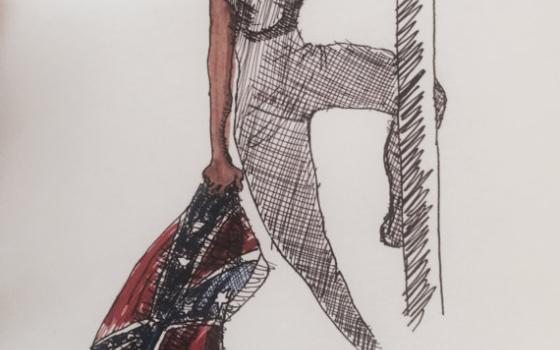I didn’t grow up in the same world as my mother and grandmother. I’ve been thinking about that a lot in these last two weeks since my grandmother died.
All three of us grew up in Indianapolis – my mother and grandmother were born there, and I lived there from the time I was 2 until I left for college at 18. But we had vastly different experiences of the city. For instance, my mother remembers riding her bike to part of town that was, ostensibly, for whites only and having bottles thrown at her. I, on the other hand, went to an elementary school that was split almost exactly 50/50 between white and black students, and I spent my summers with my white best friend at the pool of the (mostly, if not completely) white country club her family belonged to.
My grandmother never really shared any personal experiences she’d had with racism growing up, but my younger sister and I knew something had to have happened, because she had fully internalized the idea that we, as black girls, had to be twice as good at everything to go half as far as our white friends. Case in point: Every time she would drop us off to ballet class, she would say to us as we got out of the car, “Don’t let any of those white girls out dance you, you hear?” And we would giggle and roll our eyes because it was just ballet. Plus, the world wasn’t like that anymore.
But now I’m not so sure it isn’t.
I don’t mean to say that a younger me didn’t believe in the existence of racism. Despite my hunky dory, peachy keen, Kumbaya interracial childhood, I never doubted that racism was still alive and well in the United States – but it seemed like it was at least banished to the secret corners of society. Yes, having a “black-sounding” name might make a potential employer less likely to give you an interview, but that employer couldn’t openly say that was the reason and not face any backlash. And we don’t allow Ku Klux Klan members be our community leaders anymore. Nowadays, discussing racism means we parse out the nuances of privilege and the effect it has had on 13 percent of the population.
But the headlines of the last two weeks – not to mention the last year since Ferguson – have reeked of an anachronistically violent and overt racism. First, nine people were murdered when a gunman with ties to a white supremacist group opened fire in a black church in Charleston, S.C., bringing to mind the long and painful history black churches have had with racialized terrorism. The massacre was followed by a rash of fires at black churches across the South and in Ohio – three of which the FBI already consider to be arsons.
What world is this? We just marked half a century since the march on Selma (click here if you somehow missed Global Sisters Report’s stellar coverage of the anniversary), but it seems like instead of moving forward, we’ve taken 10 steps back.
I remember watching the anger and sorrow unfold on social media last fall after a grand jury decided not to charge white police officer Darren Wilson in the shooting death of Michael Brown, an unarmed black man. I distinctly remember sitting on my sofa and thinking that this was it, that racial tensions in the U.S. had reached the point where a shift was inevitable. I wasn’t sure what kind of shift it would be, but I didn’t think it would be an uptick in conspicuous racism.
And yet, there has been some positive change.
Over the weekend, Bree Newsome, a North Carolina activist, became something of a national hero to some when she climbed a 30-foot-flag pole in front of the South Carolina Statehouse to remove the Confederate flag. And when police came to arrest her, she told them, “You come against me with hatred and oppression and violence. I come against you in the name of God . . . This flag comes down today!” Then (this is my favorite part) she quoted Psalm 27:1 as she descended from the pole.
People were similarly excited last spring when prosecutor Marilyn Mosby, a black woman, brought charges against all six police officers involved in the April death of Freddie Gray, another unarmed black man.
Are these two women the answer? No. Not them alone. But I do think they are representative of impending change, of the sea shift I was expecting last fall. We aren’t there yet, but the stones are being put in place. People like Newsome and Mosby are no longer letting racism, overt or otherwise, go unchecked. People around the world are using their voice to shed light on practices and attitudes that, for generations, have been taken for granted.
So, no, this isn’t the same world my mother and grandmother grew up in. Many things have changed, but many have also stayed the same. My hope and prayer is that my generation will have the same courage and grace to stand up for justice and equality.
Note: Niall-Julian Watkins's drawing of Bree Newsome is being widely shared in social and other media. He is selling prints of his drawing on Etsy. The image is used here by permission.
[Dawn Cherie Araujo is staff reporter for Global Sisters Report based in Kansas City, Missouri. Follow her on Twitter @Dawn_Cherie.]

